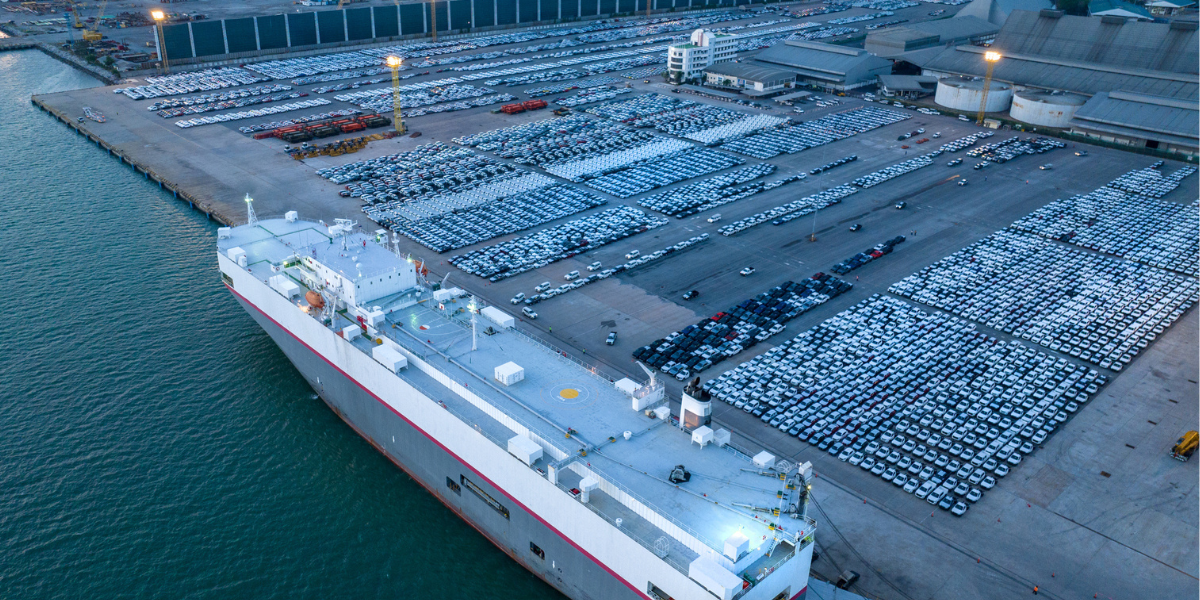Recent events of fires during ocean shipping have started fierce discussions over whether the maritime industry has kept up with the risks of lithium ion technology as the lithium ion batteries “burn with twice the energy of a normal fire” (Reuters 2023). The biggest hazard in lithium batteries is “thermal runaway”, meaning that these batteries are prone to fast and uncontrolled increase in temperature.
Another problem is that once the fire is caused by the lithium ion battery, it is difficult to extinguish and it can spontaneously reignite. What further complicates the matter are the tightly packed ships used for car transportation. Transportation ships, RoRos, named after the roll-on/roll-off method in which the cars are loaded and unloaded from the ship, are essentially floating parking garages. Although they have multiple decks and can accommodate thousands of ships, unlike parking lots, they allow for very little space between cars. This poses additional challenges for firemen who need to clean the areas around the burning zones or flood the underside of cars with water.
With the world trying to meet goals for greener transportation solutions, the maritime industry experts are looking intensely into finding solutions for safer EV transfer (Bosworth 2023). Out of 81 million vehicles sold in 2022, 9.5 percent were EVs. In the United States, the Biden’s administration is imposing rules that could shift as much as two-thirds of the new vehicles to EVs by 2032. Europe and China are enforcing equally assertive regulations towards the adoption of electric vehicles. In order to meet these demanding goals, the maritime experts and insurance companies are working hard on finding safer ways for the transport of EVs.
Cassia Networks Solution
Cassia Networks has partnered with sensor producers and transportation companies in providing a total solution for EV ocean shipping. We have successfully facilitated the transport of dozens of EV shipments. As part of the total solution, Cassia Networks has used the X2000 Enterprise Bluetooth gateway, which is equally suitable for both indoor and outdoor use. This gateway is ideal for the environment of large RoRos as it allows for multiple bi-directional connectivity, seamless Bluetooth coverage and edge processing capabilities supporting multiple applications. Most importantly, X2000 gateways are easy to deploy and manage; the remote continuous monitoring is further enabled with Cassia’s IoT Access Controller (AC). Depending on the size of the transportation ships, our customers needed to install 20-30 X2000 gateways per ship. This total solution has proven multiple benefits: it allowed for continuous monitoring of multiple lithium ion batteries, reduced the risk of direct exposure to fire, and minimized the need for a large ship crew.
To learn more about how to use Bluetooth gateways to monitor EV ocean shipping, visit our website: https://www.cassianetworks.com/bluetooth-iot-solutions/temperature-and-environment-monitoring/ or schedule a free consultation with one of our sales representatives: sales@cassianetworks. com.
Referenced Articles:
Automotive News Europe. 2023. “Ocean Shippers Playing Catch up to EV Fire Risk.” Accessed via https://europe.autonews.com/automakers/ev-technology-could-be-risk-under-prepared-maritime-shippers
Bosworth. E. Thomas 2023. “The Emerging Challenge of Electric Vehicle Transport at Sea: Lessons from Recent Fires.” Marine Safety Consultants. Accessed via https://marinesafetyconsultants.com/the-emerging-challenge-of-electric-vehicle-transport-at-sea-lessons-from-recent-fires/








